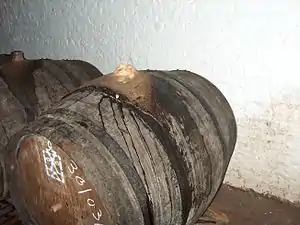Bunghole
A bunghole is a hole bored in a liquid-tight barrel to remove contents. The hole is capped with a cork or cork-like stopper called a bung. Acceptable usage includes other access points that may be capped with alternate materials providing an air- or water-tight access to other vessels. For example, a bunghole on a combustion chamber can be used to remove slag or add coal.[1] Bungholes can also be utilized to insert and remove sensing probes or equipment like mixers to agitate the contents within a vessel.

History and usage
Bungholes were first used on wooden barrels, and were typically bored by the purchaser of the barrel using a brace and bit. Bungholes can be bored in either head (end) of a barrel or in one of the staves (side). With the bung removed, a tapered faucet can be attached to aid with dispensing. When barrels full of a commodity were shipped, the recipient would often bore new bungholes of the most suitable size and placement rather than remove the existing bung. Wooden barrels manufactured by specialty firms today usually are bored by the maker with suitable bungholes, since the hobbyists who purchase them for the making of beer, wine, and fermented foods often do not have a suitable brace and bit.
Closed-head steel barrels and drums now used for shipment of chemicals and petroleum products have a standardized bunghole arrangement, with one 2 inch NPT and one 3/4 inch NPT threaded bunghole on opposite sides of the top head. Some steel barrels are also equipped with a 2-inch threaded bunghole on the side.
In literature
A notable use of the term occurs in Shakespeare’s tragedy Hamlet: While holding the skull of the dead court jester, Hamlet wonders:
To what base uses we may return Horatio. Why, may not imagination trace the noble dust of Alexander, till he find it stopping a bunghole? … Alexander died, Alexander was buried, Alexander returneth into dust, the dust is earth, of earth we make loam, and why of that loam (whereto he was converted) might they not stop a beer barrel? — Hamlet, act V, scene 1[2]
Slang and Technical Language
Usage of the term as a slang word for the anus dates back to at least the 17th century, as shown in Thomas Urquhart's translation of Gargantua by François Rabelais, first published in 1653. "... I say and maintain, that of all torcheculs, arsewisps, bumfodders, tail-napkins, bunghole cleansers, and wipe-breeches, there is none in the world comparable to the neck of a goose ..."[3]
In popular culture
- It was popularized in the MTV cartoon series Beavis and Butt-head, the term "bunghole" is used as both a personal insult and slang for anus. In his Cornholio persona, Beavis says, "I need TP [toilet paper] for my bunghole." The two central characters also use the term when referring to one another.
- U.S. President Lyndon B. Johnson is recorded using the word "bunghole" while ordering slacks over the phone.[4]
In meat industry
Bung dropper is a device inserted into the rectum of a slaughtered animal, mostly of a pig, to separate it from carcass during the dressing process.[5]
See also
References
- History of Bricks from brickfind.com website Archived 2012-03-31 at the Wayback Machine
- Shakespeare, William. Jenkins, Harold, editor. Hamlet. Act V, sc. 1, lines 199-207. Arden Shakespeare (1882). ISBN 9781903436677 P. 387
- Wikisource:Gargantua/Chapter XIII
- Power, Max. "LBJ's Bunghole Needs Room!". YouTube. Archived from the original on 2021-12-21. Retrieved 17 December 2015. "Now another thing - the crotch, down where your nuts hang - is always a little too tight, so when you make them up give me an inch that I can let out there - uhh - because they cut me. It's just like riding a - a wired fence. These are almost - these the best that I've had anywhere in the United States, but - eh - uhh - when I gain a little weight, they cut me under there, so leave me - uhh - you never do have much margin there. Let's see if you can't leave me about an inch from the - where the zipper e - -burp- ends, right on to - under my - back to my bunghole."
- Troeger, Klaus (25 June 2009). "NEW TECHNOLOGIES IN SLAUGHTERING, PRE-CUTTING AND CUTTING – INFLUENCE ON SAFETY AND QUALITY OF MEAT". Scientific journal "Meat Technology". 50 (1–2): 37–42. ISSN 2466-4812.